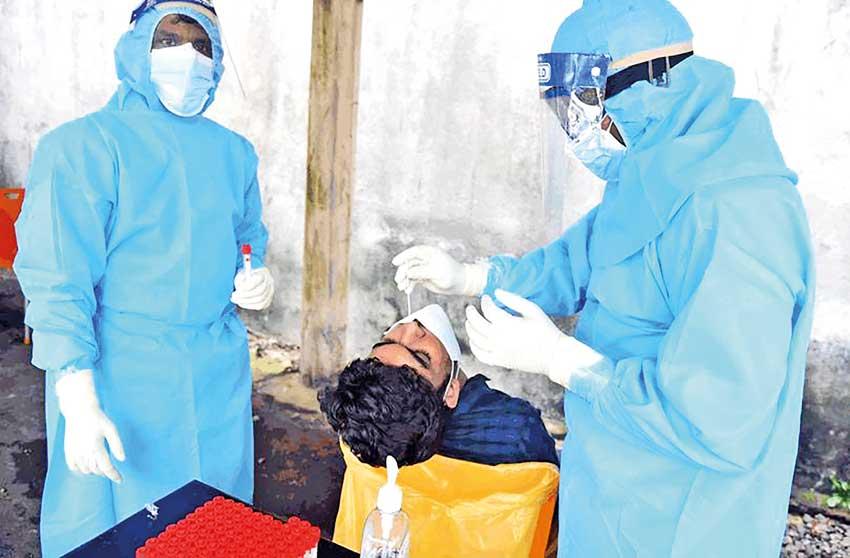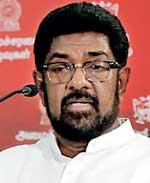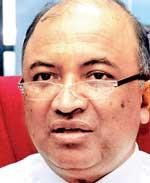18 Dec 2021 - {{hitsCtrl.values.hits}}

An Omicron virus strain test was conducted in Kollupitiya under the supervision of the Colombo Municipal Council Public Health Examiner. Pic by Kithsiri De Mel
 Medical experts and health professionals have questioned the government as to why it had stopped on-arrival PCR tests, further increasing the risk of transmission of the new Omicron variant. With three more cases detected later this week and with new data on the variant being revealed by researchers, medical experts have reiterated the importance of recommencing on-arrival PCR tests and increase the daily testing capacity. Earlier this week, the government lifted guidelines on wedding ceremonies, thereby allowing crowds to consume liquor during the ceremony. However, the same government also continues to advice the public to get their COVID jabs and adhere to health guidelines to develop ‘hybrid immunity’ towards the new variant.
Medical experts and health professionals have questioned the government as to why it had stopped on-arrival PCR tests, further increasing the risk of transmission of the new Omicron variant. With three more cases detected later this week and with new data on the variant being revealed by researchers, medical experts have reiterated the importance of recommencing on-arrival PCR tests and increase the daily testing capacity. Earlier this week, the government lifted guidelines on wedding ceremonies, thereby allowing crowds to consume liquor during the ceremony. However, the same government also continues to advice the public to get their COVID jabs and adhere to health guidelines to develop ‘hybrid immunity’ towards the new variant.
Concerns raised to President
|
Dr. Ruvais |
“Out of the three new cases detected with Omicron, one of them had received both jabs of the AstraZeneca vaccine,” opined Academy of Health Professionals President Ravi Kumudesh. “The test on this individual was done on December 11 and it is not clear if this person departed or not. Similarly, the first case, a returnee from Nigeria was unvaccinated. Therefore it’s questionable as to how that person was allowed to leave the country as well as return. These two matters require a thorough investigation and we have already written to the President.”
“With the emergence of new cases it’s clear that just because you’re vaccinated it doesn’t prevent a person from being infected with new variants,” he further said. “So far on-arrival PCR testing and COVID-variant testing facilities are available and we have the capacity to do as many as 10,000 tests per day at the two laboratories that are available. In addition, results could be delivered within two hours. The main issue right now is that on-arrival PCR tests have been stopped. Therefore the authorities should reinstate these tests if it needs to prevent Sri Lanka from moving into the next COVID wave.”
New cases being investigated
Responding to a query on the newly detected Omicron case, Deputy Director General of Health Services Dr. Hemantha Herath said that the individual was a departing passenger and after testing positive the individual was not allowed to board the flight. “We are now in the process of investigating the matter.”
 “Out of the three new cases detected with Omicron, one of them had received both jabs of the AstraZeneca vaccine. Similarly, the first case, a returnee from Nigeria was unvaccinated. Therefore it’s questionable as to how that person was allowed to leave the country as well as return. These two matters require thorough investigation and we have already written to the President”
“Out of the three new cases detected with Omicron, one of them had received both jabs of the AstraZeneca vaccine. Similarly, the first case, a returnee from Nigeria was unvaccinated. Therefore it’s questionable as to how that person was allowed to leave the country as well as return. These two matters require thorough investigation and we have already written to the President”
- Ravi Kumudesh President - Academy of Health Professionals
When asked how the first Omicron case who was found to be unvaccinated was allowed to leave the country, Dr. Herath said that there’s no rule to say that an unvaccinated person cannot leave the country. “But if they’re unvaccinated they will have to bear the cost of PCR tests and quarantine facilities in the destination country.”
Speaking about on-arrival PCR tests he further said that it’s impossible to conduct PCR tests on hundreds and thousands of people. “By doing so, we are not gaining anything. Conducting on-arrival PCR tests is not cost-effective. There are a lot of false negatives in PCR testing. Even the world’s richest countries are not doing on-arrival PCR tests.”
He further said that the only way to mitigate the spread of the Omicron variant is by getting vaccinated and by adhering to health guidelines as much as possible.

We have 2.7 million people above the age of 60 but even though the booster vaccine is freely available, only 1.2 million have administered it so far. So we have to go behind people asking them to get themselves vaccinated”
- Health Minister Keheliya Rambukwella
Govt. says no plan to recommence on-arrival PCR tests
However, when contacted, Health Minister Keheliya Rambukwella said that on-arrival PCR tests are not done on returnees who have done a PCR test prior to boarding the flight or those who have received both jabs of the COVID vaccines. “The whole world is open today. We have a lot of pressure to even do away with the bio-bubble but we haven’t allowed it as yet. When compared to other countries in Europe, Sri Lanka still has a lot of restrictions. We have 2.7 million people above the age of 60 but even though the booster vaccine is freely available, only 1.2 million have administered it so far. So we have to go behind people asking them to get themselves vaccinated.”
He further said that so far there are no plans to reinstate on-arrival PCR tests but there could be certain changes depending on the situation.
Cases underreported
As per the official government statistics the average number of daily PCR tests stood at around 7000 over the past couple of months. “However, in countries with a similar economic status, around 7000 PCR tests are being done every two hours,” opined Consultant Family Physician Dr. Ruvais Haniffa. “Hence there has been a massive underreporting of COVID cases due to the gross inadequacy of PCR testing. Therefore it is a common practice to multiply the daily COVID count in factors of 3 or 5 (or maybe even 10 in certain instances) to get an accurate count of daily cases.”

Conducting on-arrival PCR tests is not cost-effective. There are a lot of false negatives in PCR testing. Even the world’s richest countries are not doing on-arrival PCR tests.”
- Dr. Hemantha Herath - Deputy
Director General of Health Services
New data on Omicron variant
A study led by researchers from the LKS Faculty of Medicine at the University of Hong Kong (HKUMed) revealed the first information on how the novel Variant of Concern (VOC), the Omicron SARS-CoV-2 infects the human respiratory tract. The researchers found that the Omicron SARS-CoV-2 infects and multiplies 70 times faster than the Delta variant and the original SARS-CoV-2 in human bronchus, which may explain why Omicron may transmit faster between humans than previous variants. The study also showed that the Omicron infection in the lung is significantly lower than the original SARS-CoV-2, which may be an indicator of lower disease severity. This research is currently under peer review for publication.
Resurgence of influenza cases
“Over the past 20 months, the incidence of influenza cases was low, both locally and globally due to prevailing health guidelines and travel restrictions,” opined Medical Research Institute’s (MRI) Consultant Virologist Dr. Jude Jayamaha. “But with these restrictions being lifted we are now detecting a few influenza cases. Why we should worry is that there are two peaks; the greater peak is from November to January and December to February and the next peak is from April to May and June to July. Over the past 14 years we have been doing active surveillance and the expected peak is being witnessed between December to January.”
He further said that a few cases of influenza A (H3) have been reported. “Unlike Covid, a majority of influenza cases are symptomatic. Such cases have been reported from India, Bangladesh, Myanmar and the Maldives as well. It is a respiratory transmission and the best option would be to adhere to health guidelines. As per the research done by the National Influenza Laboratory, children and pregnant women are more likely to succumb to influenza A.”
“In terms of testing, the respiratory sample taken for COVID should be tested. A multiplex PCR would detect for influenza A, H1 or B. These tests are available at the MRI and three other regional virology laboratories. However, influenza is not highly infectious as COVID. Countries having the winter season are worried with the spread of omicron as well as influenza,” he added.
He further said that the World Health Organisation has been closely monitoring and been conducting influenza surveillance in over 91 countries and that Sri Lanka has been doing active surveillance since 2007. “Both influenza H3N2 and H1N1 follow a similar pattern. The available antiviral treatment is Oseltamivir but it is not required for all positive cases. But if you have a cough and cold it is better to seek medical attention,” he advised further.
28 Nov 2024 24 minute ago
28 Nov 2024 27 minute ago
28 Nov 2024 42 minute ago
28 Nov 2024 2 hours ago
28 Nov 2024 2 hours ago